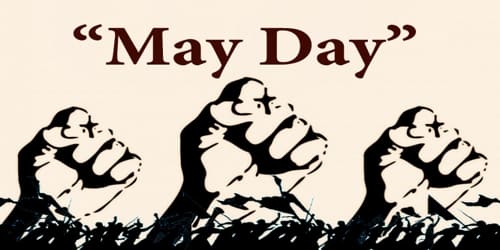On May 1 every year, the global community pauses to reflect and celebrate the labour force and the working class, the oil that lubricates the economy and bureaucracy. Nigeria is not an exception. Since the colonial days when Pa Michael Imoudu was the President of the Railway Workers Union (RWU) up to the current dispensation of multiple labour unions, May Day has been set aside by Labour movements to reflect on government policies as they affect workers, global economic challenges, best practices in specific areas, and on how to improve the welfare of workers in general.
This year’s event is coming at a strategic period, the month when there will be a change of baton from President Muhammadu Buhari to President-elect, Bola Ahmed Tinubu, who has made specific promises for tackling perennial issues related to the welfare of labour in Nigeria.
The major issues affecting labour today are associated with compensation for workers, especially as the minimum wage has remained one of the lowest in Africa, while monetary and fiscal policies have eroded the value of the naira to such an extent that many workers cannot survive on their monthly wages and salaries. Closely related to this problem is the growing informalization of the economy, where labour, among them university graduates, are exploited by employers who cannot or fail to pay the minimum wage.
Poor compensation for workers is caused by the fact that labour unions either lack the bargaining skills or deliberately let down workers whenever they bargain with government. This happens when labour leaders are practically in bed with government, as witnessed during the military era, when leaders of the Nigeria Labour Congress (NLC) were either appointed or supported by government in power to win elections to head the labour unions. Even years after military rule, labour leaders have failed to effectively bargain with government when the issue of minimum wage or incentives for workers is on the table. They yield to government’s position without much contest when government comes up with what it considers as minimum wage and this is not good enough.
Also, the government’s failure to keep to its side of the bargain in negotiation with labour in Nigeria has led to a series of industrial actions, notably by the Academic Staff Union of Universities (ASUU), Academic Staff Union of Polytechnics (ASUP), National Association of Resident Doctors (NARD), Nigerian Union of Allied Health Professionals (NUAHP), and several other labour unions.
Over the years, Nigerian governments, in a bid to persuade labour unions to call off industrial actions, entered into negotiations with striking unions but failed to implement agreements. The compensation and payments agreed upon were never appropriated for in annual budgets, creating the grounds for further strikes.
Such hide-and-seek games hurt the Nigerian economy a lot. Strikes by ASUU are costly to the education sector where university students bear the brunt of it all; industrial actions by health workers have led to avoidable deaths.
As the country marks another May Day and celebrates the Nigerian worker, we call on leaders of labour unions in Nigeria, especially the Joe Ajaero-led NLC and Festus Osifo-led Trade Union Congress of Nigeria, to note that they have a lot of work to do in ensuring that the Nigerian worker is paid a living (minimum) wage.
The issue of casualization of workers in the formal sector must be looked into critically. In a bid to increase profit, many thriving organisations outsource jobs to consultancy firms that employ Nigerians on contracts and pay them wages with or without allowances that are far below what they should earn for their contributions to such organisations.
It is for this reason that many Nigerian youths are migrating to other Western and even African countries to live slavish and inhuman lives in the name of searching for the Golden Fleece. Nigeria has abundant human and material resources that could be harnessed for better opportunities and a higher standard of living for Nigerians. Labour unions must press for this to happen, instead of acquiescing to the government’s excuses for the poor economy, while the political elite live fat on the country’s commonwealth.
On its part, the next government must fulfil its campaign promises, to ensure a better deal for Nigerian workers. At its meeting with the Organised Labour in February 2023, the president-elect, Bola Tinubu, made the following promises: “My Action Plan for a Better Nigeria, sets out a vision of opportunity, social justice and prosperity for all. I seek a Nigeria where sufficient jobs with decent wages give people the chance to live better lives.
“Where the private sector thrives, we will not disrupt it. However, where the private sector cannot do it alone, my government will take the lead in lending a helping hand… We will modernise and expand public infrastructure to create jobs, develop skills, and spur rapid growth across all economic sectors, giving real opportunity to those who previously only dreamed of it.” We challenge Tinubu to walk the talk, as we say Happy May Day to Nigerian workers!

 Join Daily Trust WhatsApp Community For Quick Access To News and Happenings Around You.
Join Daily Trust WhatsApp Community For Quick Access To News and Happenings Around You.


